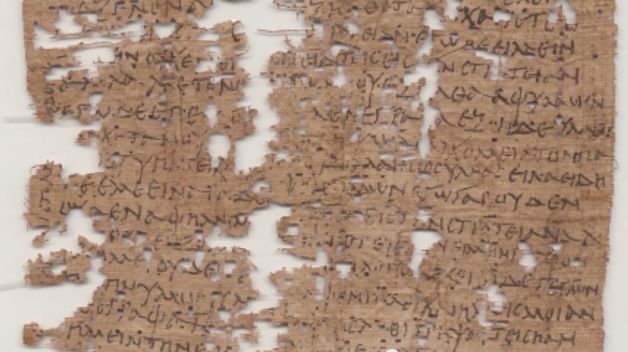American student decodes 1,800-year-old letter sent by Egyptian soldier to his family

A student has decoded a 1,800-year-old letter sent by an Egyptian soldier to his family which bears striking similarities to those serving on the front line today.
Graduate Grant Adamson, of Rice University in the United States, cracked the words on the document after being assigned the task in 2011 during a summer institute at Brigham Young University in Utah.
The letter, which was written mostly in Greek, was sent by Aurelius Polion, a military recruit serving in a Roman legion in Europe.
According to Adamson, the soldier addresses his brother, sister and family who have not been writing to him for some time.
“I pray that you are in good health night and day, and I always make obeisance before all the gods on your behalf. I do not cease writing to you, but you do not have me in mind. But I do my part writing to you always and do not cease bearing you (in mind) and having you in my heart. But you never wrote to me concerning your health, how you are doing. I am worried about you because although you received letters from me often, you never wrote back to me so that I may know how you (are),” the letter says, according.
“I sent six letters to you. The moment you have me in mind, I shall obtain leave from the consular [commander], and I shall come to you so that you may know that I am your brother. For I demanded nothing from you for the army, but I fault you because although I write to you, none of you (?) … has consideration. Look, your (?) neighbor … I am your brother.”
Adamson, who majors in religious studies, believes that Polion was stationed in the province of Pannonia Inferior at Aquincum, now Budapest, but may have travelled as far as Byzantium, now modern day Istanbul, as he was part of a legion known to be mobile.
The letter was originally discovered in 1899 by an expedition team of Grenfell and Hunt in the ancient Egyptian city of Tebtunis.
It had been catalogued briefly but no-one had been able to break its writings.
And even now, some of the letter’s contents remain uncertain and impossible to reconstruct.
In a statement, Grant Adamson said: "This letter was just one of many documents that Grenfell and Hunt unearthed. And because it was in such bad shape, no one had worked much on it for about 100 years."
"Polion was literate, and literacy was rarer then that it is now, but his handwriting, spelling and Greek grammar are erratic. He likely would have been multilingual, communicating in Egyptian or Greek at home in Egypt before he enlisted in the army and then communicating in Latin with the army in Pannonia."
To work out the date of the letter, Adamson relied on handwriting styles and other hints such as the soldier's name Aurelius.
Because of the letter’s close relation to familial concern, Adamson’s publication has featured in the latest bulletin of the American Society of Papyrologists.
Join our commenting forum
Join thought-provoking conversations, follow other Independent readers and see their replies
Comments
Bookmark popover
Removed from bookmarks